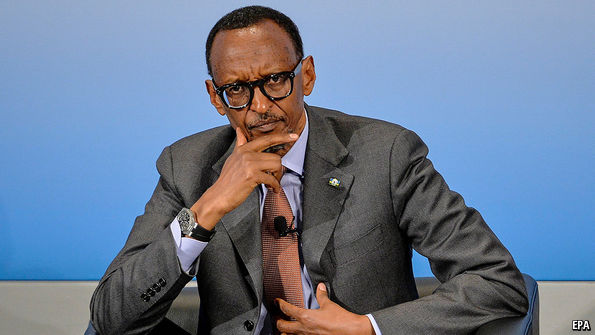Party of businessThe Rwandan Patriotic Front’s business empire
Crystal Ventures has investments in everything from furniture to finance
From the print edition | Business
Mar 2nd 2017 | KIGALI
RWANDA has a reputation for enterprise. Its government has largely stamped out small-scale corruption and trimmed regulations, making the country the second-best place in Africa to do business, according to the World Bank’s widely-followed ranking. But the dominant political party, the Rwandan Patriotic Front (RPF), does more than help business: it runs its very own conglomerate.
Crystal Ventures, the RPF’s holding company, has investments in everything from furniture to finance. It owns the country’s biggest milk processor, its finest coffee shops and some of its priciest real estate. Its contractors are building Kigali’s roads. There are several firms offering security services in Rwanda but the guards from ISCO, part of Crystal Ventures, are the only ones who tote guns. The company is reckoned to have some $500m of assets.
Its expansion is aided by the fact that its chief rival is Horizon, a similar group that is accountable to the ministry of defence, with interests in construction and logistics. Critics argue that Crystal Ventures and Horizon both get cushy government deals which mask the failures of their enterprises, several of which are said to be loss-making. Firms like ISCO and Inyange Industries, a dairy-products and drinks firm, dominate the Rwandan market. “They monopolise but they don’t deliver on development,” says David Himbara, a former presidential adviser who lives in exile.
To critics, the firm is the business wing of an authoritarian elite. It funded half of the party’s election campaign in 2010. It sold a subsidiary in 2002 after UN experts accused it of trading in conflict minerals in the Congolese war. The business purpose for two private jets that are allegedly leased by Crystal Ventures to the president, Paul Kagame (pictured), is unclear.
Rwanda is not the only place in Africa where political parties run businesses. In Ethiopia the Tigrayan People’s Liberation Front, said to be the richest party in Africa, invests in shoes, pharmaceuticals and much else. In Zimbabwe, party-owned firms have visibly floundered owing to unchecked corruption and mismanagement.
Some people argue, however, that political parties can direct capital towards long-term projects, nurturing a private sector in places where local capitalists are scarce and foreign ones are cautious. The RPF came to power at the end of Rwanda’s genocide in 1994, a rebel army led by returning exiles. Jean-Paul Kimonyo, an adviser to Mr Kagame, the former rebel leader, says that the exiles “could not come back to Rwanda without developing the country—they would have been killed.” The party used its funds to rebuild the country and increase its legitimacy. Crystal Ventures, which was originally called Tri-Star Investments, was founded in 1995.
Telecommunications was an early success. In 1998 Tri-Star partnered with MTN, a South African multinational, to establish a mobile-phone network at a time when few saw viable prospects in Rwanda. The company later listed its 20% holding in MTN-Rwanda. Crystal Ventures acts as an “icebreaker” for the private sector, says Frederick Golooba-Mutebi, a Kigali-based researcher. If the government sat here waiting for foreign investors to come and do things for them, he adds, “the investors would probably never come.” Crystal Ventures does compete for government contracts, and it and Horizon do not always win. One rival says that Chinese contractors worry him more than either firm.
That may be so. But the test is knowing when to let the private sector in, and there is little sign of that. Recent reports suggested that a majority stake in Inyange Industries had been sold to Brookside Dairy, an enterprise owned directly by the family of the Kenyan president, Uhuru Kenyatta. The reports are denied by Brookside Dairy’s managers. Crystal Ventures was also expected to list some of its other companies, but has not. In the long run, creating such an extraordinary overlap between political and commercial power is dangerous. Not only does it crowd out the private sector today. But suppose that a future party leader were less honest than Mr Kagame? Crystal Ventures would then be an efficient tool for looting the country.
http://www.economist.com/news/busin...c?zid=304&ah=e5690753dc78ce91909083042ad12e30





